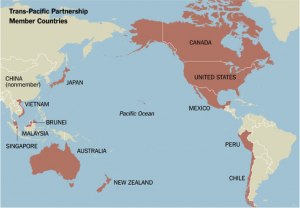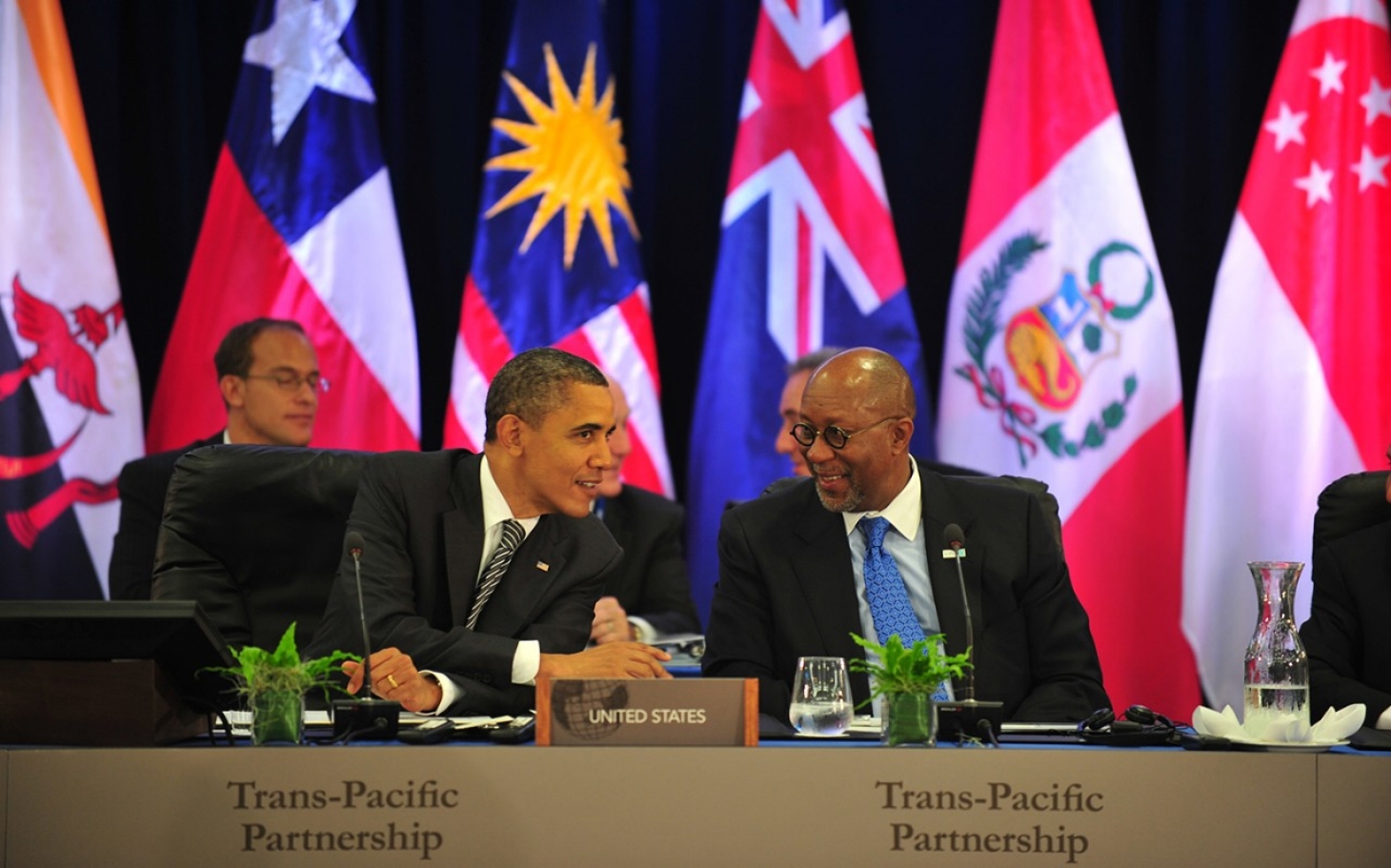It is sometimes half-jokingly suggested that the Republican Party will, on principle, oppose literally anything proposed by President Obama. In a strange turn of events, the Republicans have become the President’s strongest ally on an issue that stands among the most important of his second term: the Trans-Pacific Partnership. The TPP is a proposed trade treaty currently being negotiated by the United States and eleven other nations along the Pacific Rim, which aims to eliminate tariffs and other barriers to trade, create production and supply chains among signatories, and ensure “regulatory coherence.” The administration has been aggressive in making the case for this deal, with the U.S. Trade Representative calling it “the cornerstone of the Obama Administration’s economic policy in the Asia Pacific,” and describing it with glowing optimism. The office’s website has an interactive map detailing the number of American jobs supported by exports; for Georgia, that number is estimated at 211,000, or 21.3 percent of all manufacturing jobs. It goes on to claim that the TPP will increase American exports into expanding markets in Asia, enforce labor and environmental standards among participants, and help small businesses by enforcing intellectual property rights and regulations. The Washington Post has reported that the agreement would govern about 40 percent of American imports and exports if passed. The treaty has “29 chapters, dealing with everything from financial services to telecommunications to sanitary standards for food,” and excludes China, which is part of the point – the President has presented it as a chance for the United States to write the economic rules of the Asia-Pacific region rather than giving China the opportunity to do the same.

Speaker John Boehner and a large majority of Congressional Republicans have supported the TPP, but this optimism is not shared by many who ordinarily back the President’s agenda. The agreement’s most prominent opponents are Senators Elizabeth Warren and (presidential candidate) Bernie Sanders, the two standard-bearers of the populist left. This faction of the Democratic Party goes so far as to accuse the President of selling out the American people on behalf of large corporations. Senator Sanders has written, “The Trans-Pacific Partnership is a disastrous trade agreement designed to protect the interests of the largest multi-national corporations at the expense of workers, consumers, the environment and the foundations of American democracy.” However, some of his objections confuse the issue and contradict other principles held by this faction. For example, his claim that the agreement “would reward authoritarian regimes like Vietnam that systematically violate human rights” does not square with his support for the President’s negotiations with Iran. Is it or is it not acceptable to make deals with authoritarian regimes for the benefit of both populations? Similarly, his claim that the TPP “will also negatively impact some of the poorest people in the world” contradicts his assertion that such treaties “have forced American workers to compete against desperate and low-wage labor around the world.” It takes considerably twisted logic to argue that a policy will simultaneously provide thousands of jobs to desperate people in Vietnam and harm them. His complaint about competition from countries with weaker labor standards also ignores the fact that enforcing stricter labor standards among signatories is actually one of the main purposes of the agreement.
Since 2001, we have lost almost 60,000 factories and millions of decent paying jobs. pic.twitter.com/HstTCrwtbB
— Bernie Sanders (@SenSanders) June 19, 2015
Conservatives have picked up on the inconsistencies in the left wing’s logic. In the New York Times, David Brooks has asserted that the American-led open trade area in Asia “has created the greatest reduction in poverty in human history.” This puts the left in the awkward position of defending the right of American workers to earn high wages at the expense of poor people in developing countries – a stance that, while not self-evidently wrong, is at least remarkably un-socialist. Brooks goes on to claim that free trade agreements are not only good for the developing world, but for the United States as well. The fact of the matter is that Brooks is backed up by a remarkably strong level of agreement among economists: a study by the University of Chicago Booth School of Business asked a large pool of economists at top universities whether “past major trade deals have benefited most Americans,” and 67% responded “agree” while 16% said “strongly agree” and 9% were uncertain. Not a single person disagreed or strongly disagreed. Though some of the economists chose to qualify their answers, this study reveals the overwhelming scholarly consensus that the benefits of free trade agreements to the American people outweigh their drawbacks.
However, this consensus only applies to the merits of free trade agreements in general; this particular proposal has a number of provisions that are unrelated to trade barriers and deserve to be discussed seriously. For example, economist and Nobel laureate Paul Krugman (generally an advocate of free trade) has pointed out that the deal “involves strengthening intellectual property rights – things like drug patents and movie copyrights – and changing the way companies and countries settle disputes. And it’s by no means clear that either of those changes is good for America.” Krugman and Sanders both note Doctors Without Borders’ claim that the drug patent provisions of TPP will make medicines unaffordable in developing countries. They and Senator Warren also observe that the agreement, as currently formulated, has an “investor-state dispute settlement” (ISDS) clause, which would give multinational corporations the ability to sue governments before international tribunals. This has troubling implications for U.S. sovereignty. It also carries another risk, recently brought to public attention by comedian John Oliver on his program, “Last Week Tonight”: wealthy corporations can use “expensive lawsuits and byzantine international trade agreements” to bully smaller countries.

For example, the tobacco company Philip Morris threatened the West African nation of Togo with unaffordable lawsuits when its government tried to put health warnings on cigarettes, and Togo backed down. The operating income of Altria Group, Inc., which owns Philip Morris, is larger than the gross domestic product of Togo, so the small nation was powerless to save its citizens’ lives. Philip Morris also used a provision from a trade agreement between Australia and Hong Kong to sue Australia over its tobacco warnings, though it was unsuccessful. The maddening thing about these potential issues with TPP is that the President and other advocates generally won’t address them at all, preferring to linger on the benefits of free trade agreements in the abstract.
It seems very probable that the President and his Republican allies are correct in the big picture, but dubious in the details. The idea of a free trade agreement among these twelve nations, with the United States taking the initiative to set the rules and get into the developing markets in Southeast Asia, is an idea that makes a lot of economic and geopolitical sense. Despite the rhetoric of Senators Warren and Sanders, the benefits of free trade agreements are near-universally acknowledged by economists. However, the agreement as it exists has problematic sections, notably certain intellectual property rules and its enforcement provisions, which are dangerous to sovereignty and give too much power to undemocratic non-state actors. The President and his fellow advocates of the Trans-Pacific Partnership need to address these concerns directly and, at the very least, explain to the American people why they are necessary or beneficial, because many of us currently aren’t buying it.
By Tommy Desoutter / Photo Credit


